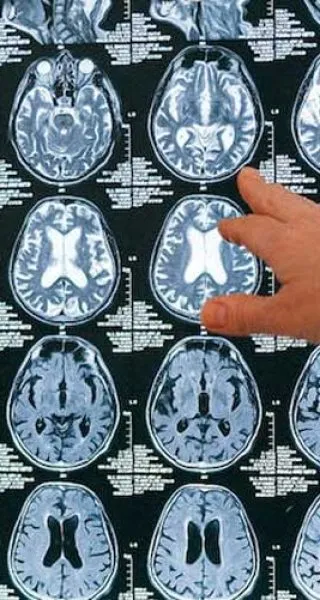Alzheimer’s disease is the most common and severe form of dementia, a condition characterized by the cognitive decline of the brain and its functions, including memory, learning, and behavior. Alzheimer’s disease occurs in the elderly – and as the average life expectancy increases, so does the prevalence of Alzheimer’s. According to the National Institute on Aging, 1 in 3 people over the age of 85 may live with the disease.
- What Is Transcranial Magnetic Stimulation Tms
- What Is Repetitive Transcranial Magnetic Stimulation Rtms Treatment
- How Does Tms Work
- How Does Alzheimers Disease Affect The Brain
- How Successful Is Rtms Treatment Of Alzheimers Disease
- How Does Rtms Improve Cognitive Function
- What Are The Side Effects Of Tms
- What Are Therapeutic Noninvasive Brain Stimulation Nibs Techniques
- Tms For Alzheimers At GIA Chicago
With treatment options for Alzheimer’s disease lacking, scientists are searching for innovative and effective treatment approaches that can improve the lives of millions of elderly people and their families around the globe. Transcranial magnetic stimulation (TMS) is one of the most promising avenues of exploration, a safe and accessible treatment with exciting potential for Alzheimer’s patients.

What Is Transcranial Magnetic Stimulation (TMS)?
Transcranial magnetic stimulation therapy is a non-invasive treatment that uses gentle magnetic waves to stimulate brain regions, leading to pronounced improvements in mood and behavior. FDA-cleared for major depression in 2008, TMS is now a licensed treatment for a variety of mental health conditions in the United States and EEA, including anxiety disorders and obsessive-compulsive disorder.
TMS is a painless procedure that does not require surgery or anesthetic. Clients can communicate with their therapist throughout treatment and resume normal activities immediately after a session. It has few side effects, the most common being temporary mild headaches and scalp discomfort.
What Is Repetitive Transcranial Magnetic Stimulation (rTMS) Treatment?
Repetitive transcranial magnetic stimulation is a type of TMS that uses trains of repetitive magnetic pulses to stimulate nerve cells. Because most therapeutic applications of TMS use rTMS, scientists and medics often use the terms interchangeably.
A typical rTMS session is 20-40 minutes long. Theta burst stimulation, a new form of rTMS, requires much shorter sessions of around 3 – 10 minutes.
How Does TMS Work?
During a TMS session, the TMS therapist passes a pulsating electrical current through a magnetic coil placed over the client’s head. This generates a magnetic field that passes seamlessly through the client’s scalp to the target brain cells beneath, inducing small electrical currents in each nerve cell. The current stimulates the cells, increasing or decreasing brain activity and affecting mood and cognitive function.
How Does Alzheimer’s Disease Affect the Brain?
Alzheimer’s disease is a progressive neurodegenerative disorder that causes damage to brain cells. It leads to a gradual cognitive decline that impairs many important cognitive functions, including memory deficits, attention, executive function, cognitive ability, and behavioral abilities.
By the time Alzheimer’s disease is diagnosed, the disease is often in its late stages, with around 70% of brain cells already damaged. This makes treating Alzheimer’s disease complicated, with existing treatments aiming to alleviate symptoms rather than reverse cognitive decline.
How Successful is rTMS Treatment of Alzheimer’s Disease?
Clinical trials of TMS for people with Alzheimer’s disease have produced positive and exciting results. The majority of trials have used high-frequency rTMS, a type of rTMS that usually increases brain activity in the target cells.
Studies found that TMS can improve a range of Alzheimer’s symptoms, including:
- object naming ability (Cotelli et al., 2006,)
- episodic memory (Koch et al., 2018)
- everyday working memory
Some trials explored the effects of transcranial magnetic stimulation combined with cognitive training, with equally promising results. A study published in the Journal of Neural Transmission found that TMS with cognitive training improved Alzheimer’s patients’ scores on the Alzheimer’s disease assessment scale-cognitive scale after 6 weeks and 4.5 months.
Several other studies supported these findings, showing TMS and cognitive training to affect important brain functions, significantly improving the lives of individuals with Alzheimer’s. In general, effects were most pronounced when used to address mild cognitive impairment rather than more advanced forms of the condition. However, given the difference in expected decline of cognitive function between people with mild and advanced cognitive impairment, these patterns may not be significant.
How Does rTMS Improve Cognitive Function?
While we still do not fully understand the precise molecular mechanisms of TMS stimulation in Alzheimer’s disease, scientists have identified several ways that TMS may affect the Alzheimer’s brain. These include:
- improving synaptic connections, helping brain cells send messages to one another
- improving neurogenesis, the way in which new brain cells are formed
- increasing neuronal plasticity, the ability of brain cells to change their activity in response to certain stimulus
- changes in inflammatory and apoptotic mechanisms, affecting the ways that cells are damaged or die
These mechanisms underpin the healthy working of the brain, helping brain cells to form, repair themselves, adapt, and communicate with one another. By preserving these mechanisms, TMS may help to protect against the degenerative effects of Alzheimer’s disease and enhance cognitive function.
What Are the Side-Effects of TMS?
TMS has few known side effects, avoiding the systematic effects on the body that come with many other medications.
The two most common side effects are temporary mild headaches and scalp discomfort, which often reduce throughout treatment. Some people also experience rarer side effects including face twitching and jaw pain, which may be reduced by adjusting the intensity and position of the magnetic coil.
While TMS does come with a risk of seizure, the risk is very low and comparable to other widely used medical treatments like antidepressant medications.
Scientists do caution, however, that the majority of studies on TMS have monitored side effects in healthy adults rather than older people. This means that we do not fully understand the long-term side effects of TMS treatment on the brains of people with Alzheimer’s disease.
What Are Therapeutic Noninvasive Brain Stimulation (NIBS) Techniques?
Noninvasive brain stimulation techniques are treatments that use electricity to stimulate certain brain cells, without requiring surgery or breaking the skin. In recent years, NIBS techniques have become increasingly common as innovative and effective therapeutic treatments for mental disorders and other conditions that affect the brain.
Some noninvasive brain stimulation therapies include:
- transcranial direct current stimulation
- transcranial magnetic stimulation (TMS)
- electroconvulsive therapy (ECT)
- vagus nerve stimulation therapy

TMS For Alzheimer’s at GIA Chicago
GIA Chicago is a pioneering mental wellness treatment center that specializes in TMS therapy. We offer individualized, innovative treatment programs that support each client to become the best version of themselves.
Our programs are based on the most up-to-date scientific research, utilizing state-of-the-art diagnostic techniques and groundbreaking treatment approaches. Our founder, Dr. Bonci, is one of the nation’s leading experts on TMS therapy, co-authoring several pivotal research papers on the use of TMS for addiction and other disorders. Our expert team applies their exceptional knowledge and experience to each client’s treatment program, giving them the best chance of reaching their recovery goals.
At GIA Chicago, we understand the importance of ethical treatment and integrity in healthcare. We treat every client with compassion and respect, always putting our patients’ care first. We’re committed to ensuring the freedom of everyone to seek and access effective healthcare, regardless of their background and story.
If you’re wondering whether a transcranial magnetic stimulation intervention – or another of our evidence-based treatment approaches – could work for you or your loved one, you’ve come to the right place. Our experts are available 24/7 to answer any questions you may have and talk you through the options available. Call us today for a consultation.





